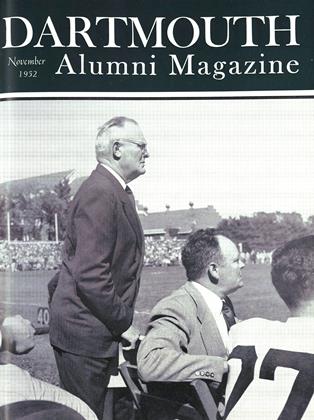Edited by Beardsley Ruml '15 in collaboration with Theodore Geiger. National Planning Association. 1952. 415 pp.
In the immediate past corporate donations to educational, scientific and welfare activities have experienced a substantial growth —in corporate interest primarily, and to a lesser extent in corporate action.
This large, well-planned and coordinated, and comprehensive but non-technical Manual is designed to bring immediate and greatly expanded activity and action in corporate giving. It is the direct result of a pamphlet report last year entitled "The Five Per Cent" by Beardsley Ruml 'l5 and Theodore Geiger. This report emphasized the great opportunity created by the 5% deduction from net earnings before taxes which corporations are permitted by federal law to make for donations to educational, scientific and welfare institutions. The pamphlet was a sharp challenge to business, alerting management to the nonretroactive features in the revenue laws. Mr. Ruml, one of the most interested and active of the business leaders seeking to stimulate greatly augmented corporate donations, has now given industry a detailed study of all manners and methods of putting a definite program into effect.
The volume covers policy and administration, including legal aspects, and then in great detail enters into possible fields of activity, with over a score of individual articles under the five main topics of "Community Projects," "Health and Welfare," "Education," "Science and Humanities," and "International Programs." Although several dozen men took part in producing the finished Manual it is evident that close collaboration existed, and the entire work is held together by a central and integrated theme.
In addition to Mr. Ruml, two other Dartmouth alumni contributed to the book. James W. Wooster Jr. '26, Executive Associate of the Commonwealth Fund, has written the highly competent and instructive chapter on Hospitals; and Charles E. Odegaard '32, Executive Director of the American Council of Learned Societies, has written a strong, and from the liberal arts viewpoint of a Dartmouth man, a pertinent and potent argument for corporate support of the Humanities.
All corporate executives, all persons connected with fund-raising for philanthropic institutions, and in a broad sense anyone who is genuinely concerned in perpetuating the American way of life will be interested in this volume and stimulated by the great potentialities involved.
 View Full Issue
View Full Issue
More From This Issue
-
 Article
ArticleOn Educational Policy
November 1952 By PROF. ANTON A. RAVEN -
 Article
ArticleThe Business of Being a Gentleman
November 1952 -
 Class Notes
Class Notes1918
November 1952 By ERNEST H. EARLEY, DONALD L. BARR -
 Class Notes
Class Notes1929
November 1952 By F. WILLIAM ANDRES, EDWIN C. CHINLUND -
 Article
Article"The Greatest Sport"
November 1952 -
 Class Notes
Class Notes1921
November 1952 By REGINALD B. MINER, ROBERT M. MACDONALD
FORD H. WHELDEN '25
-
 Article
ArticleA Survey of Geographical Distribution
May 1933 By Ford H. Whelden '25 -
 Class Notes
Class NotesDetroit
October 1938 By Ford H. Whelden '25 -
 Books
BooksOIL FOR THE WORLD,
January 1951 By FORD H. WHELDEN '25 -
 Feature
FeatureIt Adds Up to $13,809,250
January 1954 By FORD H. WHELDEN '25 -
 Article
ArticleGifts and Bequests for Past Year Total More Than Two Million
October 1955 By FORD H. WHELDEN '25 -
 Books
BooksFLAMES OF LIFE: A PICTORIAL PHILOSOPHY.
May 1961 By FORD H. WHELDEN '25
Books
-
 Books
BooksFaculty Publications
January 1936 -
 Books
BooksRecommending Ken Turner '28, Magazine Subscription Agent
JUNE 1963 By CARL W. STERN '37 -
 Books
BooksTHE PRIVATE PAPERS OF SENATOR VANDENBERG
July 1952 By Donald H. Morrison -
 Books
BooksELEMENTARY COLLEGE PHYSICS
May 1937 By G. F. Hull -
 Books
BooksCONTEMPORARY DRAMA, ELEVEN PLAYS, AMERICAN, ENGLISH, EUROPEAN.
June 1957 By KENNETH A. ROBINSON -
 Books
BooksI AND TEX.
OCTOBER 1972 By RIPLEY HANSEN

